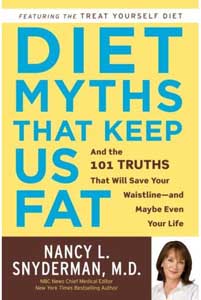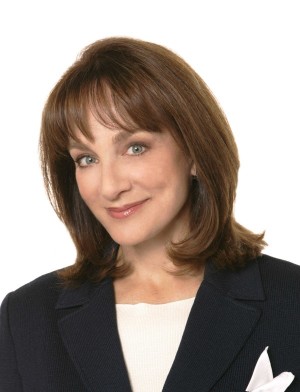Dr. Nancy Snyderman is the NBC News chief medical editor as well as the author of the recently released “Diet Myths That Keep Us Fat: And the 101 Truths That Will Save Your Waistline and Maybe Even Your Life.” This comprehensive and incredibly formative read provides clear, scientifically-proven, and practical advice that can lead you to a healthier and happier life.
We had the pleasure of talking with Dr. Snyderman about her book as well as her own diet and weight struggles. Here is what this medical expert, mother, journalist, and author had to say about what it takes for us to be truly healthy.
In your book, you coined yourself a professional dieter, in addition to all of the professional and personal roles that you undertake. What inspired you to write, Diet Myths That Keep Us Fat?
First off, I am every woman. I am every female who has ever struggled with her weight and who probably still has those extra few pounds to lose. At one point in my life, I was 200 pounds. I have taken every diet pill that was made, tried every packaged-meal plan, attempted every fad diet and finally after many years of my own struggles with weight and food, I have come to the realization that food is not the enemy and I can finally say that I am at peace with food.
Why do you think that we still hold on to these “myths” that you debunk in your book such as eating after 8 p.m. is going to lead to weight gain or that you must drink a certain amount of water every day?
There is no science behind a myth. But unfortunately we end up chasing these myths even though they are elusive. For instance, the myth about eating at 8 p.m. will make you fat is not a fact because if that is your dinner, then you may weigh a bit more in the morning but that is just because you ate late and probably haven’t gone to the bathroom yet. Whether you ate that same 400-calorie meal in the morning or the evening prior, it’s still the same 400 calories.
 It is very easy to quickly get lead down the wrong path, but in order for us to become healthier, we must start trekking down the right path. Science and medicine can be very complicated but if you learn a few basic principles, it’s actually quite simple.
It is very easy to quickly get lead down the wrong path, but in order for us to become healthier, we must start trekking down the right path. Science and medicine can be very complicated but if you learn a few basic principles, it’s actually quite simple.
One of the myths you shed truth on in your book is that our weight is not our fault. What do you mean by this?
After World War II, we learned how to preserve food from canning foods to adding certain ingredients that would prolong the shelf-life. What occurred during this time is that the value of our food decreased but the calories, fat and sugar all increased. Therefore, this significantly changed how we metabolized energy. Add this to the rise in suburbs, the decrease in funding for physical education classes, the overall increase of our sedentary lives and doing less manual labor at home has lead to the obesity rates that we are now seeing in Americans.
Sixty-seven percent of us now are either overweight or obese. In just one generation, we have added seven inches to our waistline but taken off seven years of our lives. The ripple effect is extraordinary both immediate to our own personal health as well as for all of society.
How do you feel that our current recession has affected how we take care of ourselves?
With less money in our pockets, we are spending money on the comfort foods which make us fat. It’s not surprising then that McDonald’s and Wal-Mart are doing better now because they have an enormous availability of cheap and processed food.
 But how can you tell a mother of three that she should go out to the grocery store and buy lean ground turkey and fresh hamburger buns to make turkey burgers for her family when she can run through the drive-through and get the same amount of food at McDonald’s for less money?
But how can you tell a mother of three that she should go out to the grocery store and buy lean ground turkey and fresh hamburger buns to make turkey burgers for her family when she can run through the drive-through and get the same amount of food at McDonald’s for less money?
I’m not anti-fast-food, but I would recommend that you skip the fries, don’t eat the burgers in the car and instead place them on plates, add a vegetable, even if it’s a canned vegetable and sit down to a meal. Food and meals are meant to be shared. And at some point, we have to develop a means by which we can get fair (quality) food at a fair value.
In addition, studies are now showing that preventive care is down and gym memberships are down so our health is likely to suffer. When you stop exercising and start gaining weight, the last thing you want to do is go out and exercise. It’s a vicious cycle.
The diet you put forth in your book is called the Treat Yourself Diet, but it’s not so much a “diet” per se as it is a lifestyle eating plan. Can you share with us a few of its basic premises?
I think diet is a four-letter word. I don’t believe in deprivation and I also avoid the fake stuff like artificial sugars, sweeteners and cheese. It’s important to choose the foods you love to eat and consume them at the right times.
I don’t want to eat something that doesn’t taste good. If you can’t get that piece of chocolate cake out of your mind, then have it as your entree for dinner. Treat your diet like a debit card. We keep a budget for our bank account and we need to do the same for our diets. One of the best ways to be honest with yourself about what you are eating and how much you are eating is to keep a food journal. It shows you patterns in how you eat such as whether you’re eating out of emotion, stress or hunger. I keep one every day.
To read more about these tips and many others, here is a complete review of Dr. Nancy Snyderman’s Diet Myths That Keep Us Fat.
Beginning on June 29th, Dr. Snyderman will will host a new MSNBC hour dedicated to health news and information. Tune in to hear Nancy’s expert and accessible perspective on health issues affecting your everyday life. Also, Nancy is one of the founders of BeWell.com, a new social network on health founded by America’s Top Doctors.


I’m so glad to hear it’s not my fault if I’m fat. I was thinking I just ate too much.
Our lifespans are seven years shorter than a generation ago? I don’t think so.
The U.S. Centers for Disease Control and Prevention, along with the National Vital Statistics System, reported in June, 2008, on death rates and life expectancy for the year 2006, the latest year for which numbers were available.
* From 2005 to 2006, death rates decreased significantly for 11 of the 15 top causes of death in the U.S.
* There were fewer age-adjusted deaths from heart disease, cancer, strokes, high blood pressure, and diabetes mellitus.
* Life expectancy in the U.S. rose to an unprecedented 78.1 years. [Japan holds the record at 83 years.]
—————Steve